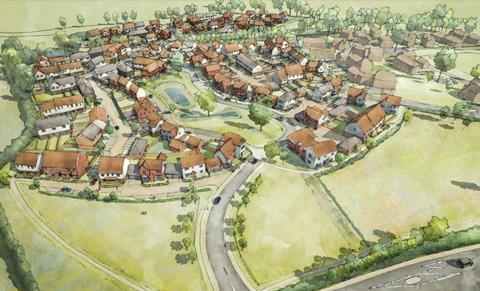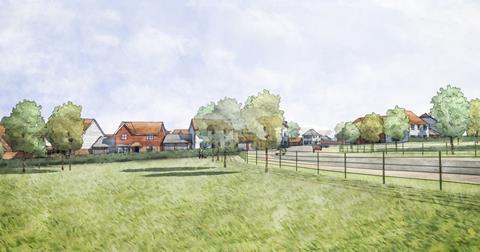Firm to challenge Gove’s ruling to turn down ‘generic’ Kent scheme last month

Berkeley Group has launched a legal challenge against Michael Gove’s decision last month to block its plans for 165 homes in the Kent Weald on design grounds, against the advice of a planning inspector.
The scheme, designed by Kent-based practice OSP Architecture, was called in by the housing secretary in April 2021 despite being approved by the local authority. Sited within the High Weald Area of Outstanding Natural Beauty (AONB), it was turned down last month on the basis it was “generic” and not “sensitively designed having regard to its setting”.
A spokesperson for Berkeley Group said the firm “will apply to the High Court for a statutory review of secretary of state Michael Gove’s decision of April 6 to reject the company’s proposed development at Cranbrook in Kent”.
The spokesperson said the firm was challenging the decision on six grounds, including the design of the homes.
Berkeley’s claim, seen by Building’s sister title Housing Today, states: “The Defendant [the secretary of state] makes a number of assertions of bad design without any reasoning or indeed without referring to any evidence on which he relies”, and goes on to allege his refusal on design grounds was “irrational”.
It also says Gove’s conclusions on the local authority’s five-year land supply and draft local plan were “erroneous and out-of-date”.
The planning inspector had recommended that the scheme be approved, given the local authority’s shortfall against its five-year housing land supply, and the “package of exceptional benefits”, including 40% affordable housing, landscape enhancements with limited associated harm and biodiversity enhancements, to be provided by the scheme.

But housing minister Rachael Maclean, who made the decision on behalf of Gove, said in the decision letter: “While he [the secretary of state] agrees with the inspector that the proposed development would deliver landscape enhancements he does not find the proposal to be of a high standard which has evolved through thoughtful regard to its context.
“Overall, he does not find that the scheme is sensitively designed having regard to its setting. He finds that the design of the proposal does not reflect the expectations of the High Weald Housing Design Guide, being of a generic suburban nature which does not reproduce the constituent elements of local settlements. He also considers that the layout of the scheme does not respond to its AONB setting.”
The Berkeley spokesperson added: “The proposal for 165 high-quality, individually designed new homes (including 66 affordable homes) was developed in close consultation with local partners and had strong support at local level.
> Also read: Gove blocks “generic” Berkeley Homes scheme on design grounds
“Approved by Tunbridge Wells Borough Council, and also by The Planning Inspectorate (an executive agency, sponsored by the Department for Levelling Up, Housing and Communities), it was vetoed by Mr Gove after a three-year planning process.”
Prior to news of the legal challenge, last month’s decision had already been greeted with dismay across the housebuilding sector, with Rico Wojtulewicz, head of housing and planning policy at the National Federation of Builders, describing it as “political expediency”.
David O’Leary, executive director of policy at the Home Builders Federation said: “The housing secretary is personally intervening to block developments that local communities actually want to see go ahead. This may be clever politics but the long-term social and economic consequences will be huge.”
The news comes after housing secretary Michael Gove caved in to backbench pressure last December and agreed to scrap mandatory local housing targets and push for greater development on brownfield land.
Berkeley’s scheme at Crane Valley, near Tunbridge Wells, had been originally given the go ahead by a planning inspector following a public inquiry in September 2021.
















1 Readers' comment